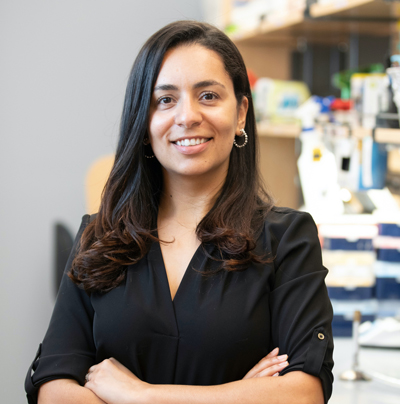
Mariana Byndloss, DVM, PhD, assistant professor of Pathology, Microbiology and Immunology, is one of eight Burroughs Wellcome Fund 2023 Investigators in the Pathogenesis of Infectious Disease (PATH).
The highly competitive PATH program provides $500,000 over five years to early-career investigators. The program intends to give recipients “the freedom and flexibility to pursue new avenues of inquiry, stimulating higher-risk research projects,” according to the Burroughs Wellcome Fund.
“Dr. Byndloss is an outstanding scientist who is doing innovative research. She is extremely deserving of this award,” said Alice Coogan, MD, the Dorothy Beryl and Theodore R. Austin Professor of Pathology and chair of the Department of Pathology, Microbiology and Immunology.
Byndloss studies the links between the gut microbiota (the microorganisms that reside in the intestines), host metabolism and disease. She and her team are exploring how the host and microbiota work together to promote health, and what happens when environmental factors like diet, antibiotics and inflammation disrupt the microbiota and increase risk for colorectal cancer, cardiovascular disease, childhood obesity and other disorders.
For the PATH program, Byndloss will study the impact of dietary changes on host susceptibility to gut pathogens such as Salmonella bacteria — a major cause of food poisoning in humans.
“The Burroughs Wellcome Fund PATH award will enable me to start a new research program focused on the impact of diet-gut microbiota interactions in promoting susceptibility to infectious gastroenteritis (intestinal and stomach inflammation),” Byndloss said. “We will combine our expertise in Salmonella pathogenesis in the digestive tract with discovery-based, state-of-the-art genomic and metabolomic techniques that are new to our laboratory.”
Byndloss and her team recently discovered that a strain of mice that normally tolerates intestinal colonization by Salmonella bacteria quickly succumbs to infectious gastroenteritis after a two-day change from normal mouse chow to a diet rich in certain amino acids. Features of the infection, such as small intestine inflammation, more closely resemble human Salmonella infection compared to previous models.
“This new model introduces the groundbreaking view that short-term dietary changes override host genetics to promote susceptibility to gut infections, and we are excited that the PATH program will support our efforts to define the mechanisms,” Byndloss said. “If we are successful, our findings may aid in developing therapeutic interventions focused on diet-microbiota interactions to prevent infectious gastroenteritis.”
Byndloss earned her DVM and PhD from Universidade Federal de Minas Gerais in her native Brazil and completed postdoctoral training at the University of California, Davis. She joined the Vanderbilt faculty in 2018. Byndloss is co-director of the Vanderbilt Microbiome Innovation Center, a campuswide effort to advance microbiome/microbiota research, therapy, education and policy.
She was recently selected by the Howard Hughes Medical Institute as one of the first Freeman Hrabowski Scholars, a program that will provide funding to support both her research and her efforts to advance diversity, equity and inclusion in science. Last year, Byndloss was named a Pew Scholar in the Biomedical Sciences, and in 2020, she received a V Scholar Award from the V Foundation for Cancer Research.












